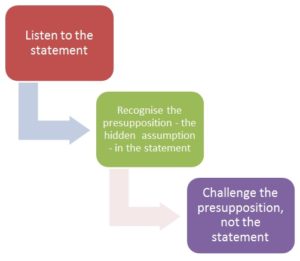Feeling unjustly criticised? Here’s how to spot hidden assumptions and what to do about them.
A presupposition is a statement or question that includes an unstated assumption. It takes for granted that the assumption is true. Whether or not it is actually true is another matter.
Some people use presuppositions to criticise indirectly, show people up or to put someone in their place. Here are some examples of presuppositions and their hidden assumptions.
| What’s your problem? |  |
You have a problem. |
| Why are you always so difficult? |  |
You are always difficult. You are being difficult now. |
| Let’s focus on the positives rather than the negatives, shall we? |  |
You are being negative. |
| Why are you wasting time on that? |  |
Whatever you are doing isn’t worth the effort. |
| I think what you are trying to say is … |  |
You are not communicating your point very well. |
| I knew you could do a good job if you tried. |  |
You haven’t been doing a good job before now. |
| When you’ve been around as long as I have, you’ll understand. |  |
You don’t understand the situation. |
How do you respond to statements like these? You might say ‘I don’t have a problem’ in response to ‘What’s your problem?’ The person might simply retort with ‘You obviously do!’ The conversation is likely to go downhill from there.
When you simply confirm or deny the statement you’re not challenging the hidden assumption. This gives the assumption credibility. You also can’t work out the reasoning and intent behind what has been said.
A better tactic is to challenge the thinking behind the statement. Calmly ask ‘What makes you believe that I have a problem?’ Include the person’s original words in your question. First, this exposes the hidden assumption. Second, if the person’s intent was simply to make you feel bad, you’ve shown you’ll stand up for yourself. Finally, you’ll have a better chance of finding out what the issues are and doing something constructive about them.

Need advice on what to say? Ask Eleanor now. Send your question and we’ll answer it in a future blog post.
Error: Contact form not found.
